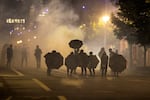Wildfires that have burned more than 1 million acres across Oregon created hazardous air quality for much of the state — leading to an unexpected pause in protests for racial justice that had lasted for more than 100 consecutive days in Portland.
Substantial rains and changing air patterns dispersed the cloud of toxic air from the city by Friday night, and protesters returned to the streets outside the Immigration and Customs Enforcement building in South Portland.
With protests resuming, it remains an open question how the fires may have affected the momentum and dynamics of the sustained movement for racial justice.
“I have asthma,” said Chris Wise, a street medic who has regularly attended the nightly protests. “I wouldn’t want to compound that with smoke inhalation.”
During the pause, some protesters turned their efforts to helping with wildfire relief. A group called “The Witches” was among those. Since the spring, their group has regularly provided aid like food, beverages and medical supplies to activists marching for police reform and racial justice in Portland. As fires in rural Clackamas County led to massive evacuations, the group traveled to Mulino, Oregon, and gave some of its supplies to firefighters and evacuees.

Demonstrators gather around a van used to disperse food, beverages and supplies during protests against systemic racism and police violence in Portland.
Jonathan Levinson / Jonathan Levinson
“We saw a need," said R, a member of The Witches who asked not to be identified by their full name. "Whether that’s with protesters, people who are houseless, or people being evacuated because of the fires.”
Wise, the street medic, called it a “natural course of action” for protesters to temporarily shift their focus to relief efforts.
“When there’s a big social and system need, it’s natural for us to step up," he said. "We take care of our community.”
With fires more stable and the air breathable for the first time in at least a week, demonstrators again turned their focus Friday toward abuses by law enforcement against communities of color.
Around 9 p.m., demonstrators marched from Elizabeth Caruthers Park in the South Waterfront neighborhood to Portland’s Immigration and Customs Enforcement building.
In less than an hour, police declared an unlawful assembly, stating that protesters had thrown items at officers. The bureau ordered the crowd to disperse via loudspeaker, stating demonstrators could be subject to arrest, citation or the use of crowd-control agents such as impact munitions.
It was a familiar turn of events for both the police and the protesters, following the unexpected break.
Reached ahead of Friday night’s demonstration, a Portland police spokesperson said the pause in protests had “enabled officers tasked with protests duties to assist with calls in each precinct” and that call response times had improved.
The Portland Police Bureau also said it wouldn’t change its approach to policing protests, insisting it will continue to deploy officers on an “event-by-event” basis.
One dynamic that has changed, at least in theory, is police options for crowd control going forward. Late last week, Portland Mayor Ted Wheeler banned the bureau from using CS gas, a commonly used form of tear gas. Wheeler’s office said the ban will last for the "foreseeable future.”
That ban does not apply to federal officers, who are often present at events near federal property. According to several independent reporters at the scene Friday, federal officers outside the ICE Building did use tear gas when trying to break up the crowd.
Wheeler confirmed Saturday that PPB abided by his order Friday and did not use the gas.
“The Portland Police complied with the ban on tear gas while still providing mutual aid,” Wheeler said in a statement. “I call on everyone in our community to step up and end the violence and to focus on advancing racial justice.”

Tear gas fills the air during protests, Friday, Sept. 18, 2020, in Portland, Ore. The protests, which began over the killing of George Floyd, often result frequent clashes between protesters and law enforcement.
PAULA BRONSTEIN / AP
Before the night was over, Portland police officers arrested 11 people, who faced a range of charges, including disorderly conduct and interfering with police.
Tabitha Poppins wasn’t among those arrested Friday, but she knows what it is like. Poppins was arrested by Portland police six times during the previous 100-plus days of protest. She frequently stood near the police line drumming on a bucket spray painted with the words “Abolish PPB.”
During the pause in protests, Poppins said, she spent part of her time at an aid station set up by demonstrators in Portland’s Lloyd District, disbursing items to people affected by wildfires and toxic smoke.
“There was a houseless woman looking for a tent, and I can’t do much because I’ve got a broken hand," Poppins told OPB. "But I thought, ‘I could help this woman find a tent.’ I made it a Tabitha special mission.
“It felt good to help,” Poppins added.
And that same feeling, she said, is what drives protesters like her to continue putting pressure on city officials to change policing and solve historical racial inequities in the city.
“With Black Lives Matter, there’s been this awakening” Poppins said. “I don’t want Black people to get killed by police. I want true equality.
“So I’ll be out there,” she said. “I can still drum with one hand.”